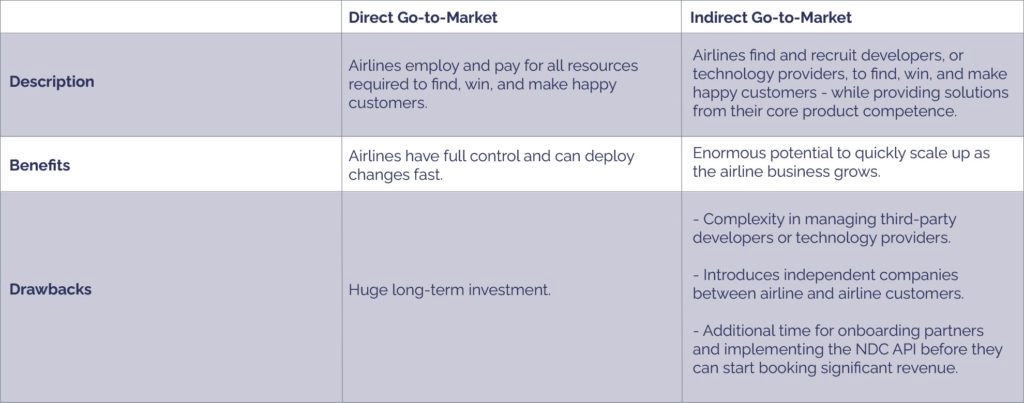NDC was gaining traction before the pandemic, and now that the industry is recovering, it is firmly on airlines’ priority list.
The current situation has grown the appetite for airline-controlled offers, and many airlines are looking to NDC to deliver over the next 12 – 36 months. For the NDC-leaderboard airlines, as many as 1:3 tickets are now sold through NDC-channels. As airlines move towards greater control and better experiences, third-party developers, and technology providers will play a greater role in contemporary NDC API development. Even though there will be a continued shift in sales to direct digital and tech aggregator channels, indirect (agency) channel distribution is here to stay. Indirect sales will constitute about 50% of airline sales in 2021. In this article, we will focus on:
- The benefits of indirect channel distribution
- Tips for airlines in finding the right API-partner, whether it be outsourced developers or technology providers
Direct v/s Indirect Distribution Approach:
First, let’s look at the main differences between direct and indirect go-to-market and how airlines can make the indirect approach work in their favor.

Every company faces the decision to ‘build or buy’, and there are benefits to adopting each approach. If you choose to outsource your NDC API development, what attributes should you look for?
Pick your Perfect API Partner!
For indirect distribution, you partner with third-parties to sell and fulfill your value proposition. These third-party retailers are usually categorized as follows:
- Travel Agencies
- Consolidators
- Retail Leisure Agencies
- Wholesale / Tour Operators
- Online Travel Agencies (OTA)
- Corporate Travel Agencies or Travel Management Companies (TMC)
- Metasearch Engines (MSE)
- GDS (Global Distribution Systems)
Third-party retailers either do their in-house development (Travel Agencies, TMC, Metasearch, OTA, GDS etc.) or hire another independent third-party technology provider to distribute their NDC content (non-GDS aggregators like Travelfusion, TPConnects, Duffel, Airgateway etc.).
A standard NDC-integration between the airline and the third-party technology provider, including Offer and Order Management, typically takes three to six months. Before deciding to commit to this approach when scaling your distribution strategy, consider these seven critical points:
1. Technical Skill: NDC is a set of standard XML messages that allows third-parties to communicate with partners. The third-party needs to demonstrate the technical ability to integrate vertical and horizontal systems to provide an end-to-end solution. Look out for:
- Overall architecture, scalability, and integration capabilities
- Ability to grow with your volume and transactions over time
- Ability to manage multiple API versions
- Ability to integrate with the existing Booking Engine
2. Airline Industry Knowledge: Technical capability alone is not enough.Third-parties must also demonstrate sound airline domain understanding. For example: Availability, Schedules, Fares, Interline, Codeshare, Ticketing Limits, Point of Sale, Currency, EMD’s, Payment, etc. These are essential to delivering a successful project.
3. Proven Project Management Experience: Ensure that you are assigned a project management team to work with you throughout the engagement. Get a precise understanding of project schedules, timelines, and what resources can be made available to accomplish the goal. Don’t be shy to ask for their track record or talk to other airlines who have worked with the past vendor.
4. Travel Industry Market Knowledge: When a retailing feature is added, airlines want third-party developers to manage critical timeliness (e.g., personalized offers) and often this requires knowledge of the nuances (e.g., compliance requirements) within specific markets.
5. Quality, Operational Excellence, and Staff to Back It up: Do not compromise quality and operational excellence! Any successfulstrategic distribution partnership requires a dedication to quality, consistency, transparency, and adequate resourcing to ensure a project is completed on time and delivers value fast.
6. NDC Certification: Last but not least, we strongly recommend that the aggregator or the IT provider is NDC Certified or capable with Level 4 (Full Offer and Order Management).
7. Future-proofing: NDC and ONE Order world are ever-evolving. Given the changing landscape, it’s essential that your vendor is reputed, committed, and is there for the long haul.
Accelya’s FLX NDC API (NDC Level 4 Certified) and support program enable airline systems to become the ’single source of truth.’ This robust delivery API allows the full suite of airline content to reach the marketplace via any channel, including airline kiosks, call centers, websites, mobile apps, and agency/GDS. For the indirect channels, the FLX NDC API can be implemented directly into agency and OTA systems, corporate booking tools, GDS, or other content aggregators.






